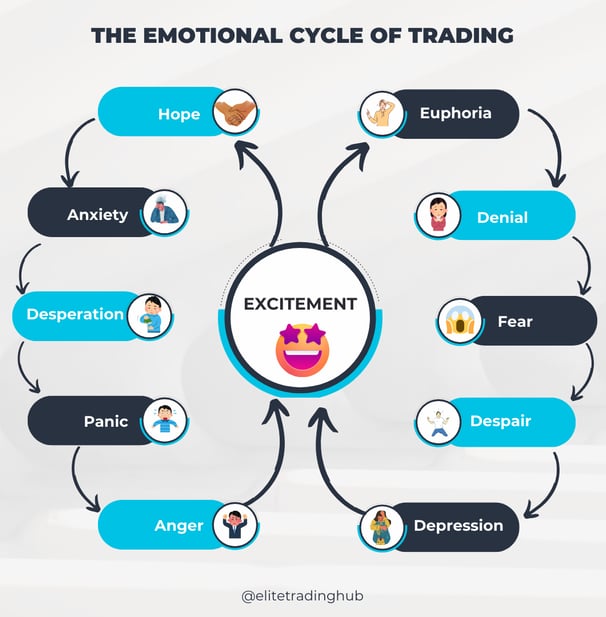The Psychology of Prop Trading: Mental Challenges and How to Overcome Them 🧠💼
Prop trading offers exciting opportunities, but it's not just about strategies and market analysis. The mental game is equally crucial, if not more so. In this deep dive, we'll explore the psychological challenges that prop traders face and provide actionable tips to overcome them. Whether you're a seasoned pro or just starting your prop trading journey, mastering your mind is the key to long-term success. Let's unlock the secrets of trading psychology! 🔓📈
Why Trading Psychology Matters in Prop Trading 🎭
Before we delve into specific challenges and solutions, let's understand why psychology plays such a vital role in prop trading:
High-Pressure Environment: Prop traders often manage significant capital, amplifying stress.
Performance-Based Career: Your success directly impacts your income and career progression.
Rapid Decision-Making: Markets move fast, requiring quick thinking under pressure.
Emotional Rollercoaster: Wins and losses can trigger intense emotional responses.
Common Psychological Challenges in Prop Trading 🚧
1. Fear of Loss 😰
Symptom: Hesitating to enter trades or exiting too early.
Impact: Missed opportunities and underperformance.
2. Overconfidence 🦚
Symptom: Taking excessive risks or ignoring stop-losses.
Impact: Catastrophic losses and blown accounts.
3. Revenge Trading 😠
Symptom: Attempting to quickly recover losses with risky trades.
Impact: Compounding losses and emotional distress.
4. Analysis Paralysis 🧊
Symptom: Over-analyzing and failing to act on opportunities.
Impact: Missed trades and diminished confidence.
5. Imposter Syndrome 🎭
Symptom: Doubting your abilities despite evidence of competence.
Impact: Underperformance and increased stress.
6. FOMO (Fear of Missing Out) 🏃♂️
Symptom: Entering trades without proper analysis due to market excitement.
Impact: Poor trade selection and increased losses.
7. Inability to Accept Losses 🙈
Symptom: Holding onto losing positions hoping for a turnaround.
Impact: Larger losses and missed opportunities elsewhere.
8. Perfectionism ✨
Symptom: Seeking the "perfect" trade setup, leading to inaction.
Impact: Missed profitable opportunities and stunted learning.
The Emotional Cycle of Trading 🎢


Strategies to Overcome Psychological Challenges 💪
1. Develop a Robust Trading Plan 📝
Action: Create a detailed plan with entry, exit, and risk management rules.
Benefit: Reduces emotional decision-making and provides a framework for consistency.
2. Practice Mindfulness and Meditation 🧘♂️
Action: Incorporate daily mindfulness exercises or meditation into your routine.
Benefit: Improves focus, reduces stress, and enhances emotional regulation.
3. Keep a Trading Journal 📔
Action: Document your trades, thoughts, and emotions regularly.
Benefit: Helps identify patterns, improve self-awareness, and refine your strategy.
4. Set Realistic Goals and Expectations 🎯
Action: Establish achievable short-term and long-term trading goals.
Benefit: Reduces pressure and provides a sense of progress and accomplishment.
5. Utilize Positive Self-Talk and Affirmations 🗣️
Action: Develop and regularly practice positive trading affirmations.
Benefit: Boosts confidence and helps maintain a constructive mindset.
6. Implement a Pre-Trading Routine 🌅
Action: Create a consistent routine to prepare yourself mentally before trading.
Benefit: Puts you in the right mindset and improves focus and discipline.
7. Practice Virtual Trading or Paper Trading 🔬
Action: Use simulators to practice new strategies without financial risk.
Benefit: Builds confidence, tests strategies, and helps manage emotions.
8. Seek Support and Mentorship 🤝
Action: Join trading communities or work with a trading coach.
Benefit: Provides perspective, support, and learning opportunities.
The Role of Physical Health in Trading Psychology 🏋️♀️
Don't underestimate the connection between your physical well-being and trading performance:
Regular Exercise: Reduces stress and improves cognitive function.
Proper Sleep: Enhances decision-making and emotional regulation.
Balanced Diet: Provides sustained energy and mental clarity.
Hydration: Maintains focus and prevents fatigue.
Case Studies: Psychological Turnarounds in Prop Trading 📖
Let's look at a few real-world examples of traders who overcame psychological challenges:
The Fearful Trader: How Sarah conquered her fear of loss and increased her profit potential.
The Overconfident Rookie: John's journey from blown accounts to consistent profitability.
The Revenge Trader: Mike's transformation from emotional trading to disciplined success.
The Perfectionist: Emma's path to accepting "good enough" trades and boosting her performance.
Tools and Resources for Improving Trading Psychology 🛠️
Trading Psychology Books: "Trading in the Zone" by Mark Douglas, "The Daily Trading Coach" by Brett N. Steenbarger.
Mindfulness Apps: Headspace, Calm, or Insight Timer for daily meditation practice.
Biofeedback Devices: Tools like HeartMath to monitor and manage physiological stress responses.
Trading Simulators: Platforms like TradingSim or NinjaTrader for risk-free practice.
Performance Tracking Software: Tradervue or Edgewonk for detailed trade analysis and journaling.
Conclusion: Mastering the Mental Game of Prop Trading 🏆
In the high-stakes world of prop trading, your mindset can make or break your success. By recognizing common psychological challenges and implementing strategies to overcome them, you can significantly enhance your trading performance and career longevity.
Remember, developing a strong trading psychology is an ongoing process. Be patient with yourself, stay committed to your growth, and don't hesitate to seek support when needed. With time and practice, you can train your mind to be your most powerful trading tool.
Remember, in prop trading, your most important asset is between your ears. Invest in your mental game, and watch your trading results soar! 📈🎉
